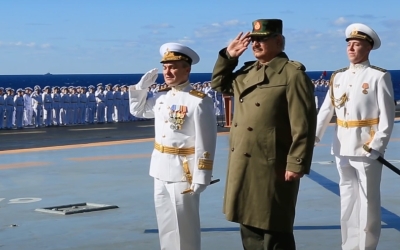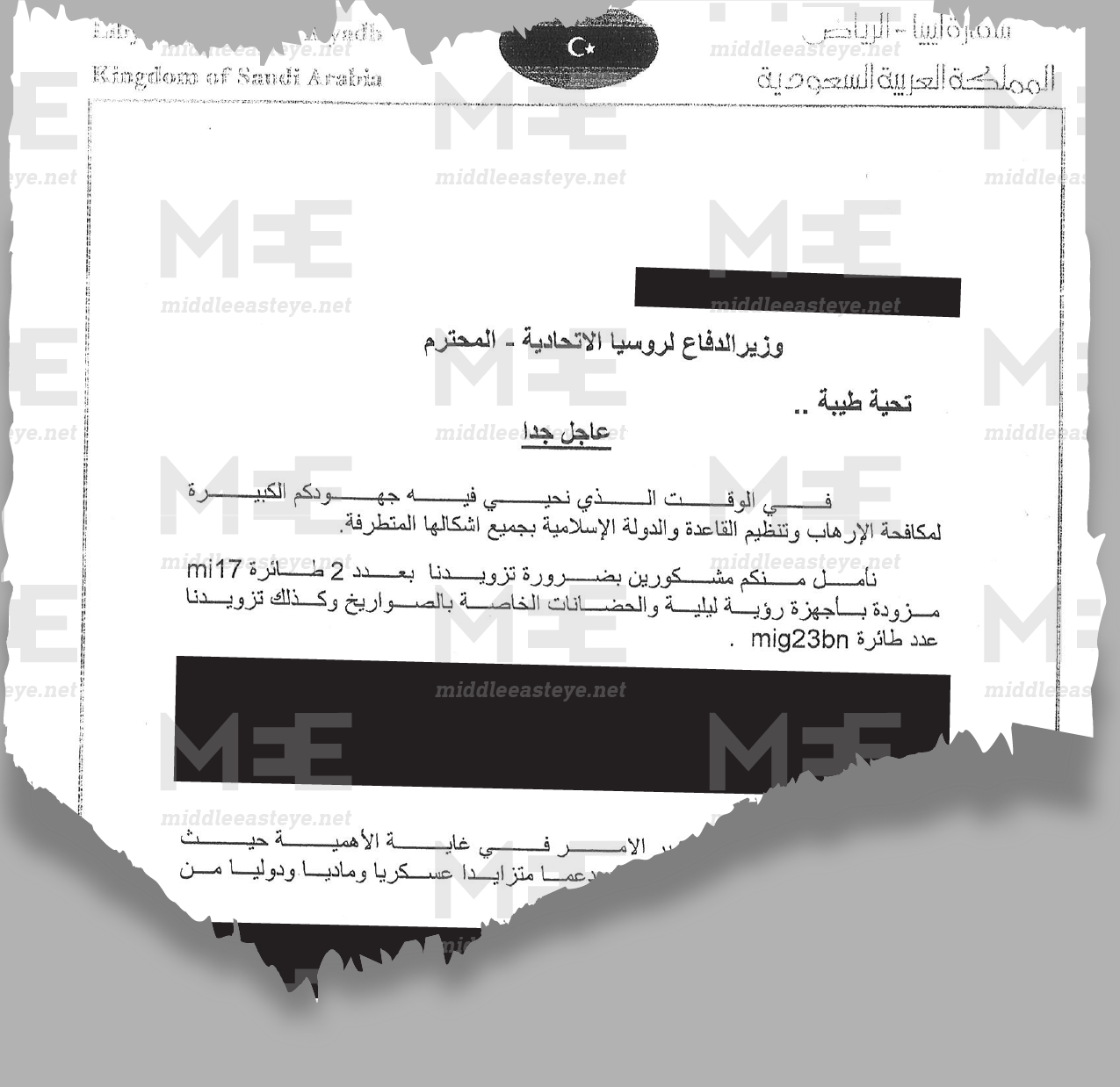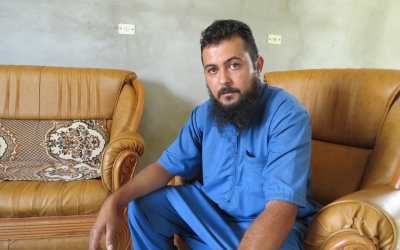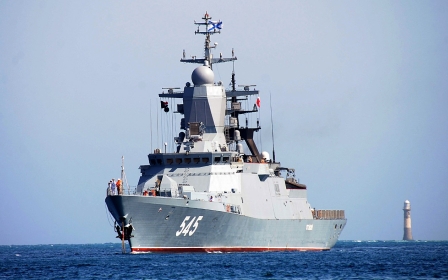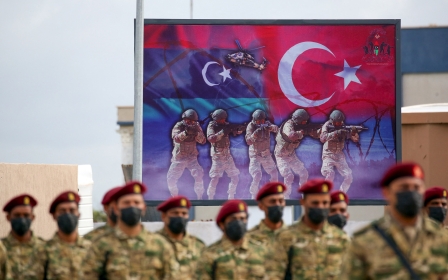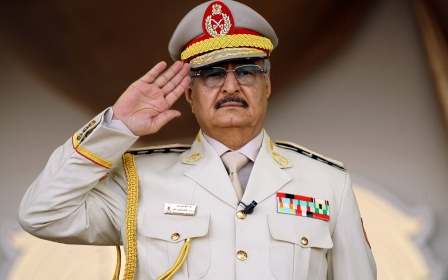Libya: Haftar told Russians that Egypt agreed to brief Moscow on US talks
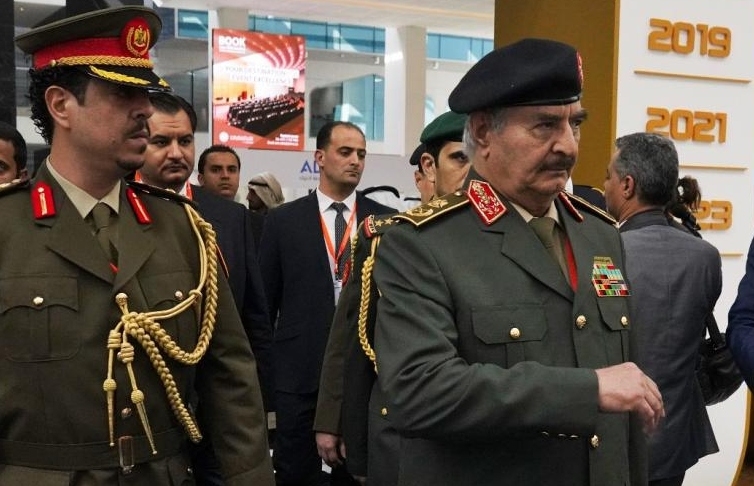
Egypt's military agreed to inform Russia about its talks with the US even after Washington warned Cairo not to cooperate with the Kremlin over Libya, according to a letter sent by Libya's eastern commander Khalifa Haftar to Russian Defence Minister Sergei Shoigu.
The correspondence is one of several exchanges from a cache of diplomatic cables obtained exclusively by MEE between Haftar, his emissaries and Russian officials.
MEE obtained the documents from a Libyan source close to Haftar's circle.
'We have agreed with the Egyptian military leadership to inform you with the full extent of the situation'
- Khalifa Haftar, letter to Sergei Shoigu
In the undated letter to the Russian defence chief, Haftar requested that Russia send fighter jets "at the earliest possibility" to Egyptian airports "close to the Libyan border" to conduct air strikes, but complained that Washington was warning Cairo not to use its territory as a launching pad to help topple Libya's UN-recognised government in Tripoli.
The letter is understood to have been sent when Haftar visited a Russian aircraft carrier in the Mediterranean in January 2017 and was seeking to deepen military cooperation between Cairo and Moscow to support his forces.
New MEE newsletter: Jerusalem Dispatch
Sign up to get the latest insights and analysis on Israel-Palestine, alongside Turkey Unpacked and other MEE newsletters
"You are aware of pressures from the American administration on the Egyptian Republic which stands with the Libyan Arab Armed Forces," Haftar wrote.
"We have agreed with the Egyptian military leadership to inform you with the full extent of the situation."
The reference to Egypt keeping Moscow up to date on its talks with the US underlines the challenges Washington faces today as it tries to recruit Cairo to help oust Russia from Libya and other African hotspots, analysts say.
A 'gesture' from Sisi
Driving mercenaries from the Kremlin-linked Wagner Group out of Libya and Sudan was a main topic of conversation between CIA Director Bill Burns and Egyptian officials during Burn's visit to Egypt in January.
Secretary of State Antony Blinken also raised the topic directly with President Abdel Fattah el-Sisi the same month in Cairo.
Jalel Harchaoui, a Libya expert at the Royal United Services Institute for Defence and Security Studies (Rusi), said he was sceptical Cairo would help.
"The Egyptians are still deeply in bed with the Russians," Harchaoui told MEE. "They are politically very intimate with each other."
Ties between Egypt and Russia extend beyond Libya. Cairo, like several other Arab countries, has refused to support western sanctions against Russia, whose state-owned nuclear company Rosatom is building a power plant in Egypt.
Despite the war in Ukraine, Russia's share of wheat going to the import-dependent country has also increased.
"If you are President Sisi and Washington asks for your help to oust the Russians from Libya, you are going to make a symbolic gesture and call it a day," Harchaoui added.
Haftar, who controls vast swathes of eastern Libya, has enjoyed significant backing from Russia, the UAE and Egypt, as well as diplomatic cover from France.
Libya is divided between the UN-recognised government in Tripoli and a rival administration in the east affiliated with Haftar.
A UN-backed plan to unite the country and conduct presidential elections has stalled amid disputes over voting rules.
Diplomats and analysts have said that Moscow and Cairo are aligned wanting to keep Haftar in control of eastern Libya, where Russian mercenaries operate Pantsir anti-aircraft systems defending Haftar's territory.
Cairo has also asked Russia to use its veto at the UN Security Council to block a proposal being hashed out in the UN designed to revive Libya's election process, two diplomats with knowledge of the matter told MEE.
Egypt's foreign ministry did not respond to MEE's requests for comment.
An estimated 1,000 Wagner fighters are deployed in Libya. The group, led by Yevgeny Prigozhin, a close associate of Russian President Vladimir Putin, has played an important role in expanding Moscow's influence across Africa.
Its mercenaries have been sent to Mali, Sudan and the Central African Republic (CAR), where they control lucrative gold and diamond mines.
MEE has previously reported on massacres carried out by Wagner fighters around gold mines in the CAR.
At the time of the Shoigu letter, Haftar's self-styled Libyan National Army was engaged in fierce fighting for Benghazi and Libya's "oil crescent", a coastal area where most of the country's oil production happens.
Haftar's request for military intervention came as he raged to Shoigu about battling terrorist groups who were allegedly receiving "big financial backing" from Qatar.
Haftar, who routinely described militias he was fighting against as terrorist groups, also accused the UK of covertly working to "eliminate" his army by coordinating military action with the Bunyan al-Marsous (BAM) forces, a collection of militias organised from the city of Misrata who played a key role in defeating Islamic State in the city of Sirte.
'The Egyptians are still deeply in bed with the Russians... They are politically very intimate with each other'
- Jalel Harchaoui, Libya expert
At the time, Qatar's relations with several of its Gulf neighbours had broken down with Bahrain, Egypt, Saudi Arabia and the UAE cutting ties with Doha.
The quartet imposed a blockade on gas-rich Qatar over allegations that it supported "terrorism" and had close relations with Iran. Doha denied the charges and said the boycott was aimed at curtailing its independence.
MEE reached out to the Qatari Foreign Ministry for comment but did not get a response by the time of publication.
The British Foreign and Commonwealth Office also did not respond to requests for comment.
Libya splintered into warring factions after the overthrow and death of Muammar Gaddafi in 2011. Fighting in the strategic, energy-rich country soon descended into a proxy war with foreign powers backing opposing sides.
A United Nations-led peace process largely ended the fighting in 2021, but Libya remains divided into rival, armed camps.
'Russia: Impenetrable dam'
Complaints about foreign meddling by Haftar and his allies, even as they sought military intervention from Moscow, are peppered throughout the cables.
Italy is slammed for its "provocative" aid to "extremists" in a separate letter sent by Libya’s then-ambassador to Saudi Arabia and Haftar confidante, Abdul-Basit al-Badri, to Shoigu, Russian Foreign Minister Sergei Lavrov, and Mikhaïl Bogdanov, Vladimir Putin's special envoy for the Middle East and Africa.
'Russia's anti-westernism and image as a security bulwark is customised and carefully crafted'
Samuel Ramani, Rusi
"We affirm Italy's ambitions in controlling and having a monopoly over Libya’s resources, which has existed since the Italian colonisation of Libya," he wrote, also reiterating Haftar’s claim that Qatar was backing extremists.
An Italian diplomatic source told MEE that "it is not Italy's policy to interfere in foreign countries’ internal affairs" when asked about the allegations.
The Libyans also applauded Russia's military might in the letters. "It has been proven to the world that Russia is the country that has fought terrorism and stood as an impenetrable dam against this disease in many countries," Badri allegedly wrote to Kremlin officials.
Analysts said the comments shed light on how Moscow has effectively manoeuvred around the ambitions of local rulers, anti-western-sentiment and security vacuums to deepen its influence across Africa.
"Russia's anti-westernism and image as a security bulwark is customised and carefully crafted to the sentiments its local clients are promoting," Samuel Ramani, an analyst at Rusi and author of an upcoming book on Moscow's activities in Africa, told MEE.
"That's how Russia pitches itself."
'Conduit to Libya'
Haftar also boasted that he had captured Chadian mercenaries who he accused of being funded by Qatar in his letter to Shoigu, and discussed plans to parade them on TV.
In keeping with Libya's often fluid alliances, Haftar would later recruit Chadian fighters to his side.
In a separate letter viewed by MEE understood to be from the same time period, Badri, currently Libya's ambassador to Jordan, requested that Russia supply Haftar with Mi-17 helicopters equipped with night vision devices, missiles and Mig-23 fighter jets.
Badri told MEE that he severed ties with Haftar in 2017 and that he has had "no contact" with the Russians for years.
In 2017, Haftar visited Russia's only aircraft carrier off the coast of Libya to drum up military support. Shortly after the visit, Colonel Vladimir Kirichenko, military attache at the Russian embassy in Saudi Arabia, requested Haftar provide information on Libyan radar systems and the extent of his control over airbases, according to a letter dated 25 January 2017.
Moscow would eventually send MiG-29 and Su-24 jets to Libya piloted by Russian mercenaries. The delivery was revealed by Libya's UN-recognised government in Tripoli and the US in May 2020.
Russia stepped up its assistance to Haftar during the 2019-2020 war on Tripoli, which killed at least 2,500 and displaced another 150,000 people.
Wagner fighters provided training, and security to high-ranking members of the Libyan National Army (LNA), and aided artillery units. As the conflict progressed, they took an increasingly offensive role, laying landmines and booby traps and taking up sniper positions.
While Haftar has emerged as Russia's premier partner in Libya, Moscow has also engaged with rival parties, including Gaddafi's son, Saif al-Islam, and even the Tripoli-based government Haftar went to war with.
"Behind the scenes Russia always viewed Haftar as mercurial and unpredictable," Ramani from the Rusi think-tank, told MEE.
"For the Kremlin, Haftar is a conduit into Libya, but an incompetent military commander that they have never really been all in on."
This article is available in French on Middle East Eye French edition.
Middle East Eye delivers independent and unrivalled coverage and analysis of the Middle East, North Africa and beyond. To learn more about republishing this content and the associated fees, please fill out this form. More about MEE can be found here.


